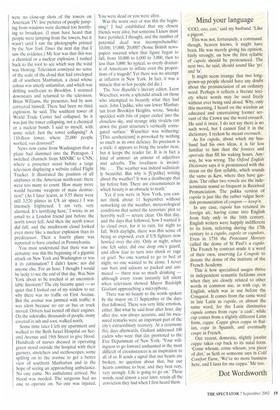Mind your language
'COO, coo, coo,' said my husband. 'Like a pigeon.'
This was not, fortunately, a command, though, heaven knows, it might have been. He was merely giving his opinion, fairly strongly, on how the first syllable of cupola should be pronounced. The next two, he said, should sound like `po* and `la'.
It might seem strange that two longgrown-up people should have any doubt about the pronunciation of an ordinary word. Perhaps it reflects a literate society where words may be used freely without ever being said aloud. Why, only this morning, I heard on the wireless an educated and entertaining former servant of the Crown use the word enroach. He said it twice. I do not say there is no such word, but I cannot find it in the dictionary. I reckon he meant encroach.
As for cupola, about which my husband had his own ideas, it is far less familiar to him than the fomices and opercula that fill his waking hours. Anyway, he was wrong. The Oxford English Dictionary says it is pronounced with the stress on the first syllable, which sounds the same as Kew, where they have gardens. The other two vowels are the indeterminate sound so frequent in Received Pronunciation. The pukka version of cupola is just like the rather vulgar Scottish pronunciation of coupon — kewp'n.
In any case, cupola has retained its foreign air, having come into English from Italy only in the 16th century. English writers were happily indifferent to its form, referring during the 17th century to a cupelo, cupolo or cupuloes. Even in 1716 the Protestant Mercury called the dome of St Paul's a cupilo. The French by contrast made it a word of their own, reserving La Coupole to denote the dome of the institute of the French Academy.
This is how specialised usages thrive in independent semantic fiefdoms even when they are closely related to other words in common use, as with cup, in English, which was in use before the Conquest. It comes from the same word in late Latin as cupola, or almost the same word, for the Latin diminutive cupula comes from cupa 'a cask', while cup comes from a slightly different Latin form, cuppa. Cuppa gives coppa in Italian, copa in Spanish, and eventually coupe in French.
Our recent, domestic, slightly jocular cuppa takes cup back to its natal form. 'Come whoam, come whoarn, you piece of dirt,' as Seth or someone says in Cold Comfort Farm, 'We've no more business here, and I lusts for me cuppa.' Me too.
Dot Wordsworth


























































 Previous page
Previous page